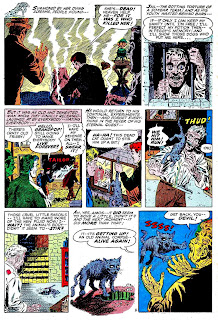The supernaturals, as assistant editor Norman Fruman called them, sold quite well, and ACG added Skeleton Hand, which didn’t make the crossover to a Comics Code-approved book (probably because of its title), Out of the Night, and a one-shot issue of The Clutching Hand, which isn’t identified as ACG on its cover. That’s likely because ACG was trying out stories that didn’t have the boy-girl happy endings that a lot of their “horror” stories did. Fruman is listed as editor of The Clutching Hand. According to one bio I read of Fruman, he wrote about 700 scripts for Better/Nedor/ACG.
Here are examples of the two styles, one with the happy ending, and one more typical of the horror comics from other publishers.
From Forbidden Worlds #17 (1953), drawn by Al Camy:
From The Clutching Hand (1954), drawn by Kenneth Landau:
**********
More Ken Landau, including a pre-Code story from Out of the Night, and a story for the very last issue of Forbidden Worlds in 1967. Just click the thumbnail.














8 comments:
One way or another, Ann Warren needed a new boy-friend. Bruce Holmes let two people die because no one was around to give … a pep-talk to him.
Each of these stories is characterized by a frequent feature of nth-tier horror comics, the invocation of unfamiliar principles as if they are well established. So the story is a bunch of rabbits pulled from hats, or of little dei emerging ex machina. And, in each of these tales, we even have the characters behaving as if they and most other people recognize these principles; I guess that this is in support if the pretense that these principles are familiar.
Daniel, to hopefully extend what you are saying, horror stories like these operate in an alternate universe where the supernatural supersedes our universe of no shape-shifters, ghosts, animated corpses, and all those other mainstays of horror that are taken for granted in fiction.
As ridiculous as they are, we accept them as "true" for the few minutes it takes to read them. When we're done reading we can say "What th — ?!" as reality kicks back in.
The problem with "as it turns out" is it's general unfairness of it; pre-announcing the rules builds a relationship with the reader, and leads to "ah-ha" moments. Otherwise, it's just a series of unconnected events that tumble into place.
These stories, wordy, wordy, wordy, wordy, and tightly paneled. I know EC get accused of this, but EC had word economy, every word usually meant something. Here we have info-dumps by monsters!
Indeed, horror fiction necessarily requires that different rules need to be in effect. But it can call upon tradition, or it can innovate with explanation. Having vampires suddenly fear chartreuse diesn't cut it; rationalizing that innovation by having some character say “As a vampire, she fears the color chartreuse!” doesn't cut it. Somebody needs to explain this fear, since it's an innovation (whereas the traditional fear of the cross doesn't require an explanation because it's traditional).
Daniel, Brian, that's story-telling 101, isn't it? The famous Chekhov's Gun: "Remove everything that has no relevance to the story. If you say in the first chapter that there is a rifle hanging on the wall, in the second or third chapter it absolutely must go off. If it's not going to be fired, it shouldn't be hanging there."
If established early in the story that the color chartreuse is feared by a vampire then a skilled writer could make use of such information later in the story (as silly as a vampire being affected by chartreuse sounds. Next thing you know you'll say the vampire is repelled by garlic! Italy would then be vampire free.)
As for the cross being feared by the vampire, was it Richard Matheson who wrote the vampire story with the cross being used and the vampire saying, "Oy, have you got the wrong vampire" -- words to that effect, anyway...but I digress.
Brian, word economy is important, especially in comics, where space is finite. Comics being visual I believe a writer should write to allow for maximum use of visuals, but sometimes they get enamored of their own words. Once again, that's where an editor should come in. It's tougher when the writer -- Feldstein -- was also the editor.
ACG didn't start out as Nedor. It was a different company. Nedor eventually evolved into Pines, and petered out in the late 50's / early 60's.
Darkmark, thanks for making the distinction, but if ACG wasn't Nedor, it had ancestry in common.
Hadn't seen the Yawning Graves story before, nice post Pap-- thanks!!
Post a Comment